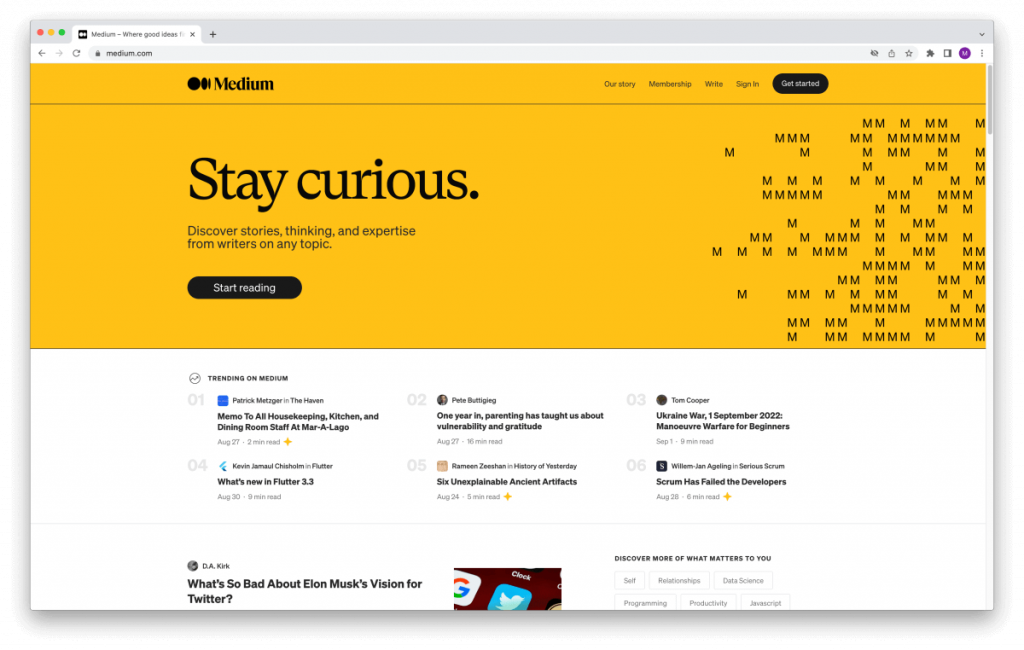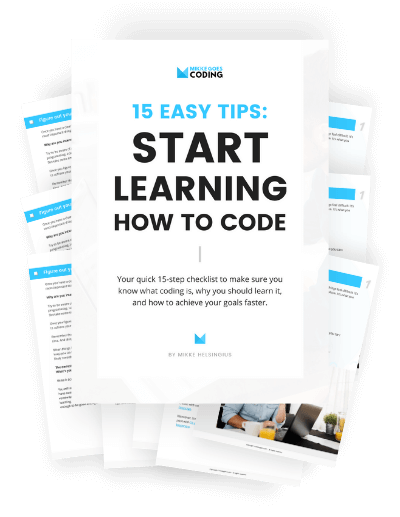So you want to become a Python developer, but you’re not sure where to start?
Browsing through Python developer jobs can easily feel overwhelming.
Job listings mention requirements ranging from various Python frameworks to popular Python libraries for data analysis, data visualization, and machine learning algorithms.
It can seem confusing what skills you really need to learn to start a Python developer career.
Since Python is used in so many different industries and for a myriad of projects in web development, data science, software engineering, and more, no two Python developer jobs are alike.
So when you are new to Python programming, you are probably wondering:
- What Python skills should I learn?
- How do I decide what area to specialize in as a Python developer?
- Where should I start learning the skills I need?
If this sounds familiar, you are in the right place.
In this guide, I will help you find the right learning path based on your personal goals.
We will look at different Python developer specializations and what skills you need to add under you belt to land your first Python tech job.
And of course, you will find out exactly how to learn those skills and take the first steps towards becoming a Python developer.
Let’s jump right into it!
Please note: This post contains affiliate links to products I use and recommend. I may receive a small commission if you purchase through one of my links, at no additional cost to you. Thank you for your support!
Table of contents: How to become a Python developer
Here’s an overview of the topics we’ll cover in this guide:
- What is a Python developer?
- Python developer skills
- What skills you need to learn
- How to learn Python programming fast
- How to land your first Python developer job
Share this post with others!

What is a Python developer?
If you are new to programming and Python, your first question may be:
What is a Python developer exactly?
A Python developer uses the Python programming language to design, develop, and manage different programs and project.
Python developers usually work in teams of multiple developers, designers, and project managers.
You can find a plethora of different tech job titles that use the Python programming language:
- Web developer
- Software engineer
- Back-end developer
- Data analyst
- Data scientist
- Machine learning engineer
- Artificial intelligence engineer
- and many more…

When it comes to dedicated Python developers, they have a deeper understanding of the language and can tackle more complex tasks with it.
Thus, a dedicated Python developer knows how to use the Python language for solving problems and producing valuable, meaningful insights in areas like:
- Data collection and database creation
- Data analysis and science
- Machine learning algorithms
- Artificial intelligence
- Web development
- Scripting and automation
If you choose to become a Python developer, the best way to start would be to focus your efforts on learning one of these areas first. Pick the area you find the most interesting.
That way, you will learn the exact, targeted skills needed for an entry-level Python developer job in a field you genuinely enjoy.
As you gain more experience and confidence in your skills, you can deepen your knowledge by conquering additional fields, too.
Although Python developers work across a myriad of industries and areas, they all need to learn and master the Python programming language. Let’s look at that next.
The Python programming language: What is Python?
What is the Python programming language?
How is it different from other popular programming languages?
And most importantly: is Python easy to learn?
Python is currently one of the most widely used programming languages worldwide.
The TIOBE Index ranks Python as the #1 most popular language, with a positive trend and growing popularity.

Furthermore, the Stack Overflow Developer Survey 2023 ranked Python as the 4th most widely used technology among professional developers.

What makes Python so popular, then?
Python is a very beginner-friendly programming language. It reads a lot like English, so it’s relatively easy to learn.
Also, as I mentioned earlier, you can use Python for multiple different projects across a myriad of industries. In other words, Python is a multi-purpose programming language.
Once you learn and master Python, you can choose between a handful of specializations. This makes Python an attractive language to learn, since it’s in high demand across so many application areas.
Of course, transitioning between them means you would need to gain practical experience before applying for a job. But you wouldn’t have to learn a whole new programming language from scratch.
Since companies can use Python for building their website, coding their own software, and analyzing big data, it helps save time and streamline the development workflows across different teams.
For more details, check out my full article on the advantages of learning Python.
Python developer job titles
When you browse through job openings, the most common Python job titles will be “Python Developer” and “Python Engineer”.
However, you will also find other job titles and openings that require a deep understanding of Python, like:
- Web Developer:
Works together with web designers, UI/UX designers, and graphic designers to plan, build, and improve website projects and web applications. Python web developers are responsible for server-side (or back-end) development, meaning that they take care of the programmatic parts of a web-based project, while web designers create the visual parts that the end user interacts with (the front-end). - Software Engineer:
Plans, writes, tests, and deploys code and programs. They make sure their programs run smoothly, update them regularly, fix bugs, and maintain their code. Software engineers work in virtually every industry out there. - Data Analyst:
Collects, analyzes, and interprets data to create actionable business insights. Data analysts collect large amounts of data, sift through it, draw conclusions based on their analyses, and visualize and communicate their findings to help their organization. - Data Scientist:
Has a deep understanding of their business and industry and combines skills in data analysis, computer science, mathematics, and statistics to discover data-driven business opportunities and strategies. - Machine Learning Engineer:
Machine learning (ML) is a sub-field of data science and artificial intelligence (AI). Machine learning engineers focus on statistical analysis to produce useful machine learning algorithms for AI.

Common Python developer job responsibilities
Now that you know what job titles are relevant, what does a Python developer do exactly?
Here’s a quick overview of some common Python developer responsibilities, duties and tasks:
- Writing efficient, scalable code
- Communicating and coordinating with internal teams and possibly clients; learning about their needs and providing technical expertise and recommendations
- Testing and debugging programs
- Implementing security solutions
- Developing data protection measures
- Evaluating the results from past feature updates
- Improving the functionality of existing systems
- Assessing and prioritizing feature requests
At the end of the day, your responsibilities will depend on the industry you work in and the employer you choose.
Your exact duties will also depend on whether you are a junior Python developer or have more seniority and work experience.
Python developer salary: How much Python developers make
Now that you know what job titles you could apply for and what responsibilities Python developers deal with, you’re probably wondering:
How much does a Python developer make?
Especially if you want to learn Python to start a new career in tech, knowing whether Python developers are in high demand and how much you could make are important points to consider.
The average salary for a Python developer is $125,299 in the United States. There are currently 11,807 Python developer jobs posted on Indeed.com.

Your salary will of course depend on your level of experience. Also, the location of your employer plays a big role for your earnings.
According to Indeed, the highest-paying cities for Python developers in the United States include:
- Jersey City, NJ
- Houston, TX
- Chicago, IL
- Providence, RI
- Charlotte, NC
- New York, NY
- Austin, TX
- Columbus, OH
- Dallas, TX
Is Python development a good career choice?
Judging by the number of job openings for Python developer, it’s safe to say that Python is in high demand in the tech job market.
According to the U.S. Bureau of Labor Statistics, the overall trend for computer and IT occupations is projected to grow 13% from 2020 to 2030, which is faster than the average for all occupations (8%).
Furthermore, here are the growth projections for further relevant fields:
- Web developers and digital designers: 13% growth from 2020 to 2030
- Software developers: 22% from 2020 to 2030
- Database admins and architects: 8% from 2020 to 2030
Hence, most fields relevant to Python developers are expected to grow at least as fast or even faster than the average for all occupations.
All in all, Python developers are in high demand as it is. And with a positive trend for employment opportunities across multiple specializations, Python development will remain a highly lucrative career choice in the future, too.
Python offers a ton of flexibility in the job market. You will find jobs across a variety of industries, locations, and employers, so you can find Python developer job opportunities that you are genuinely interested in.

Python developer skills
Now you know what a Python developer does, what responsibilities the job entails, and how much Python developers make.
Next, let’s look at some of the most important skills you need to start a career as a Python developer.
Surely, you need to learn and master the Python programming language, fundamental programming concepts, and programmatic thinking.
But it’s even more important to look at what companies are looking for. Therefore, I’ve gathered the following insights using these two sources:
- Job listings, descriptions, and requirements
- Technologies used in big, high-profile tech companies
This will give you a better idea of what real-world skills you need under your belt to become a Python developer.
Python developer job descriptions
Let’s look at what skills employers are looking for when hiring Python developers.
Here’s what I did to analyze this part:
- Source: Indeed.com
- Experience level: Entry-level to mid-level job listings
Keep in mind: you don’t need all these skills to land your first Python developer job. There are a ton of skills listed in job ads, and it helps to possess them all. But you can get hired even if you’re missing a few.
Thus, take these requirements with a grain of salt and don’t be discouraged even if the list of qualifications feels overwhelming.
Very few applicants tick all the boxes, and companies don’t even necessarily expect it.
Job #1: Python software developer/engineer
In this software engineering graduate job listing, you’ll notice that it requires skills in Python or another programming language like C, C++, Javascript or Java, understanding object-oriented programming (OOP) and model-view-controller (MVC) design patterns, and more.

Job #2: Python web developer
This entry level Python developer job listing mentions a few basic technologies and skills you should have under your belt for any Python web developer job:
- Python programming
- Django framework
- SQL

This software developer position with Adobe for university graduates requires Python, JavaScript/TypeScript and Java skills, understanding of latest web development patterns, knowledge in building RESTful APIs, and more.

This job ad for entry-level web developers mentions Python, frameworks like Flask and Django, knowledge in JavaScript and Angular, object-oriented design and programming, web application development, and more.

This entry level Python developer job requires knowledge in Python libraries, frameworks, and modules. Also, it specifically mentions the Django framework, basic understanding of front-end technologies (HTML, CSS, JavaScript), and more.

Job #3: Python data analyst
This next data analyst job requires data science and data engineering skills including descriptive statistics, functional programming, data visualization with D3.js, and more. Also, you need to have 12 months of experience with cleaning, coding, and analyzing complex data files in Python and SQL.

This data and analytics associate job posting requires experience in wrangling and analyzing data with tools like Python or R, PowerBI, Tableau, and Alteryx. Familiarity with Excel is assumed, and experience in SQL is a plus.

In most Python developer job listings you will also find requirements for soft skill, such as:
- Attention to detail
- Communication skills
- Problem-solving skills
- Organization and time management skills
- Team spirit
- Ability to work in an agile, time-sensitive environment with timeline constraints
High-profile tech companies
Because Python developer job listings and the requirements vary so widely, it’s a good idea to narrow down your focus a bit more.
One helpful way of knowing what to learn and which skills to acquire is to think of your dream employer. Maybe you’d like to work at Google, Meta, or Netflix, for example?
Make a short list of companies you would love to work with, and check their technology stacks on stackshare.io.
Here’a a quick overview of a few popular tech companies and their tech stacks (in addition to Python):
- Dropbox: NGINX, MySQL, Amazon S3
- Google: C++, Java, Golang, LevelDB, AngularJS, Node.js, React
- Instagram: Django, Java, NGINGX, PostgreSQL, JavaScript, React
- Lyft: Flask, PHP, Java, NGINX, MongoDB, Golang, C++, Amazon S3, React, HTML, Bootstrap, AngularJS
- Netflix: Flask, Java, MySQL, PostgreSQL, Amazon S3,
- Pinterest: Django, Java, NGINX, MySQL, Golang, React, Amazon S3
- Shopify: NGINX, MySQL, Ruby, Rails, Golang, React
- Spotify: Java, NGINX, PostgreSQL, Bootstrap, Amazon S3
- Uber: PostgreSQL, MySQL, MongoDB, Java, Golang, Swift, Objective-C
As with learning to code in general, here it’s a good idea to start with the end in mind:
If you could work for any company out there, which one would it be?
Once you know the employer of your dreams, you can find out what technologies you need to learn to land your first tech job with them.

What skills do you really need to become a Python developer?
Now that you know what skills companies are looking for in the job market, I know you may feel a tad overwhelmed. There is a lot to learn, so let’s break it down to what you absolutely must know.
Regardless of the specialization you wish to focus on, you need to master these basic Python developer skills:
- Python core programming concepts: data structures, OOP concepts, variables and data types, file handling, exception handling, etc.
- programmatic thinking
- problem solving
- algorithms
Since Python is a multi-purpose programming language with several applications, let’s look at the additional skills you need to know for each of the most popular specializations:
1: Python web developer skills:
To become a Python web developer, here are the basic skills to add under your belt:
- Python web frameworks: Django, Flask, Web2Py, Pyramid, Bottle
- Object-Relational Mappers (ORM)
- basic understanding of front-end web development technologies: HTML, CSS, JavaScript
- version control: GitHub
2: Python data scientist skills:
To start a career as a Python data scientist, focus on learning these essential skills:
- SQL
- Python packages: Scikit learn, Matplotlib, NumPy, etc.
- wrangling, cleaning, analyzing, and visualizing data
- mathematical concepts such as probability and statistics
- familiarity with spreadsheets
3: Python machine learning and artificial intelligence engineer skills:
If you want to become a machine learning (ML) or artificial intelligence (AI) engineer, make sure to learn these skills:
- data science concepts
- machine learning (ML) algorithms
- neural networks
- acquiring, analyzing, visualizing data
- producing insights from data

The soft skills you need to become a Python developer
If you want to become a Python developer, knowing how to use the Python programming language is just one side of the coin.
What matters even more in the hectic tech environment these days is how well you can work together with others.
Python developers usually work together with an entire team of other developers, designers, and project managers.
Thus, being a great communicator and a team player is just as important as mastering the Python language.
It’s crucial that you know how to take input from others while also knowing how to express yourself so that others understand what you mean – even if they aren’t familiar with Python or coding in general.
The most important soft skills may sound rather simple:
You need to be easy to work with.
Be friendly, listen to others, and make sure you understand what your coworkers mean at all times.
I’ve worked with dozens of designers and developers on hundreds of projects so far. Whenever I start a new project and gather a new team, I always contact the people who are friendly and easy to work with – even when I could choose someone who has more years of tech experience.
So it all boils down to being humble, polite, and having respect for everyone else in the team.
Here are some essential soft skills you should possess to become a successful Python developer:
- Team spirit
- Adaptivity in agile, fast-paced working environments
- Detail-orientedness
- Strong communication skills – verbal and written
- High level of creativity
Last but not least, what matters the most is that you show genuine passion, curiosity, and motivation throughout your job application process and every day at work, wherever your Python developer path takes you.

How to learn Python development and programming
Here I have gathered a list of online resources to help you start your Python developer journey.
I’ve included beginner-level courses and tutorials you can use to level up your skills from absolute beginner to more advanced topics.
Optional: Computer science and programming basics for beginners
If you are new to coding and programming, it may be helpful to start with a general computer science course.
This way, you will have a better understanding of how computers and other hardware work under the hood. This will help you develop better, more efficient programs with Python.
It also gives you an introduction to programmatic thinking, problem-solving, and a logical approach to your Python projects.
Check out one of these:
- What Is Programming? on Udacity
- CS50’s Introduction to Computer Science on edX
- Computer Science 101: Master the Theory Behind Programming on Udemy

Python programming courses
These Python courses are perfect for beginners. Start with them if you are entirely new to Python programming.
- Introduction to Python Programming on Udacity
- Learn Python 3 on Codecademy
- 100 Days of Code: The Complete Python Pro Bootcamp on Udemy
- Scientific Computing with Python on freeCodeCamp
- Complete Python Bootcamp From Zero to Hero in Python on Udemy
- Introduction to Python on DataCamp

Python web development courses for beginners
These Python web development courses will deepen your knowledge of how to use Python to build useful web-based applications:
- Django 3 – Full Stack Websites with Python Web Development on Udemy
- Learn Python in 30 Days on One Month
Python data analysis and data science courses
These data-focussed Python courses help you learn the tools you need to start a career as a data scientist, machine learning engineer, or artificial intelligence specialist:
- Python for Everybody Specialization on Coursera
- Learn Python for Data Science, Structures, Algorithms, Interviews on Udemy
- Data Analysis with Python on freeCodeCamp
- Understanding Machine Learning on DataCamp
- Machine Learning A-Z (Python & R in Data Science Course) on Udemy
- Python for Data Science and Machine Learning Bootcamp on Udemy
- Free Pandas Tutorial – Master Data Analysis with Python – Intro to Pandas on Udemy
- Machine Learning with Python on freeCodeCamp

MikkeGoes.com resources
For even more helpful Python resources, check out these in-depth articles I’ve compiled for you:
- 12 Essential Advantages of Python (Why You Should Learn Python)
- Learn Python Online: The Best Python Resources for Beginners
- 120+ Best Places to Learn to Code For Free
- 19 Best YouTube Channels to Learn Python for Free
- 20+ Best Web Development Books For Beginners
- Python Projects for Beginners: 10 Easy Python Programming Project Ideas
How to get hired as a Python developer: 8 must-use strategies
When it’s time to apply for your first Python developer job, remember that you don’t have to meet every single requirement listed in a job ad.
You don’t have to be the best Python developer out there, either.
You simply need to be good enough. That’s it.
Here are some helpful tips and strategies to get hired faster and land your first Python developer job more easily:
Tip #1: Start with the end in mind
If you want to save heaps of time and land your first Python job as quickly as possible, you should start with the end in mind.
What this means is: you will set yourself a goal, and then work your way recursively to the present moment, defining the steps you need to take to achieve that goal.
Here’s what you should do:
- Start by figuring out what your dream job is.
- Then, pick a few ideal companies that you would really like to work for.
- Next, research what technologies and programming languages they use. Browse their careers page, find job listings on Indeed.com and use StackShare, for example.
By now you will have a clear overview of what skills you need to learn and practice.
Especially if you find interesting job listings on their website, you can make a list of the requirements and qualifications mentioned in those job ads.
Now, all you need to do is learn those skills one by one. Each skill is a milestone towards your final goal.
This way, you won’t have to second-guess what you’re learning. Also, you won’t waste your time learning skills you don’t really need to get hired. Makes sense, right?

Tip #2: Build a personal website or portfolio
These days it’s crucial to start building your digital footprint as soon as you can.
Your digital footprint consists of your overall online presence on the WWW. The more visibility you gain, the more likely it is that a headhunter or recruiter finds you and gets in touch.
Therefore, right now is the perfect time to start building and cleaning up your online presence and your personal brand.
It all starts with setting up your own website. You need this platform to show people who you are, what you do, and what you can create with your skills.
Creating a portfolio website is the easiest way to showcase your best work samples and share your contact information with your website visitors.
To set up your website, you have two options:
- Create it from scratch with HTML, CSS, and JavaScript
- Use a content management system such as WordPress
If you are not familiar, WordPress is a powerful, hugely popular tool for getting your website up and running within minutes. WordPress powers 43% of all websites worldwide.
Find out more in my post on why you should use WordPress for your first website.

Both methods for setting up your website are just as good, trust me.
I built my first portfolio website with HTML, CSS, and JavaScript because I was learning those languages anyway. My portfolio site was a great opportunity to practice and improve my skills.
After a while I switched over to WordPress.
At that point, I wanted to spend my time building projects that showcased what I could create with my coding skills.
Hence, I wanted my portfolio site to be quick and easy to use, so that I could upload new projects and manage all my content more easily.
For a step-by-step tutorial, read my free guide on how to create a portfolio website on WordPress.
To get your website online, you need two things:
- Domain name
- Web hosting
A domain name is the URL for your website – the web address your visitors see in their web browsers. My domain name for this website is mikkegoes.com.
When you register a domain name, you can use it for 12 months at a time. After that, you need to renew the registration.
A domain name will cost you around $10–15 per year.
Register your full name as the URL for your personal website if you can.
If the .com extension isn’t available, go for .co, .me, .net, or .org, for example.
I use Bluehost and Namecheap for my domain names.
Web hosting means you will sign up with a hosting provider and your website files will be stored on their web servers. That way, people from all over the world can visit your site.
A simple web hosting plan will cost about $3–10 per month. High-performance hosting plans start at around $25–30/month.
Again, I use and recommend Bluehost for web hosting. Their plans are affordable starting at $2.95/month. They offer great value for your money.
Plus, if you sign up with them, you also get a free domain name for the first 12 months.

If you want top-notch performance and a lightning-fast website, set up your hosting plan with Kinsta.
Your portfolio site should include the following pages:
- About me
- Projects/work samples
- Contact
Remember to let your personality shine through. Recruiters want to see who you are!
Ideally, your website content conveys a sense of who you are as a person and whether you would be a good fit for their team.
Tip #3: Use the right social networks
Aspiring tech professionals should always have an up-to-date profile on LinkedIn.
Here’s why:
- LinkedIn has 850 million users in over 200 countries and over 58 million companies listed.
- 40% of companies on LinkedIn rely on skills filters to identify candidates. Hence, make sure you keep your profile and skills information up-to-date.
- 72% of recruiters use LinkedIn to find potential employees, making it the most popular social network for recruitment.
Summing it up: LinkedIn it the platform to be on when you are looking to get hired.

If you write code, also set up a profile on GitHub.
Joining Twitter and Instagram can help you network with other like-minded techies, too. Find me on Twitter @mikkegoes and come say hi!
Tip #4: Start a blog
If you like to write, start a blog.
Publishing high-quality blog posts helps you grow a readership and following. This, in turn, grows your online footprint, increasing your chances of being discovered by the right recruiter at the right time.
Create in-depth, high-quality content that is helpful to your readers. You don’t have to be the best writer or developer in the world. To help others, you simply need to be one step ahead of them.
How can you get started, then?
Usually, your blog will be part of your website. You can start a programming blog in a matter of minutes using the WordPress content management system.
You can also share your content on a publishing platform like Medium or freeCodeCamp.

I started this blog back in 2016 as a personal learning journal. I simply wanted to share my tech journey with others when I was still 100% new to coding.
Pretty quickly I started seeing more visitors and received lovely feedback from my readers. This motivated me to put out even more content out there, and so the Mikke Goes Coding blog started growing even faster.
I now see visitors from over 190 countries, have shared my learning strategies with hundreds of thousands of like-minded techies, and I receive collaboration requests from companies every day.
Starting a blog was one of the best decisions I made in my first weeks of learning to code. It helped me track my progress, deepen my knowledge, and motivate others going through a similar experience.
Blogging sounds like a good idea? Awesome! For a detailed guide, read my step-by-step tutorial on how to start a programming blog.
Tip #5: Publish content
If blogging isn’t your thing and you’re not comfortable with putting your thoughts out there in writing, you can publish other types of content, too.
Here are a few examples of content you could create:
- Start a podcast
- Share your thoughts and experience on Instagram
- Start a YouTube channel and share helpful videos
- Design and sell your own products (setting up your own online shop is a fantastic opportunity to practice your web development skills!)
- Produce and publish interviews with people in the industry (a great way to make connections!)
Tip #6: Follow an online presence strategy
Whatever method you choose to gain visibility online, remember to be strategic about it.
Only build your brand and online presence in ways that help you get closer to your career goals. Otherwise, you will be wasting your precious time.
Build projects that reflect the type of work you want to do in the future.
Publish content that showcases your knowledge and expertise in the field you want to work in.
Finally, remember to interlink all the platforms you are active on:
- Link to your social network profiles from your website and vice versa.
- Include a link to your portfolio in your email signature.
- Ask your readers and followers to share your content with others.
Tip #7: Network with others
Network and connect with people whose own connections are at least somehow relevant to what you want to achieve
Joining a coding group in your area is a great idea, for example. You will meet like-minded students who will most probably end up working in tech, too.
Use the freeCodeCamp local study group directory to find fellow students near you.
Nurture your connections and invest time and effort in maintaining your network of people in your industry. You never know who will be sitting across the table at your next job interview!
Tip #8: Build projects
Last but certainly not least, you want to build meaningful projects with your skills as soon as possible.
Adding your own Python projects to your portfolio site or to your GitHub shows others that you know how to use your skills to create something useful and valuable.
Because the truth is:
You can write Python code as soon as you finish your first coding lesson. But you need to understand what programming is about to actually build something meaningful with your code.
Sharing your Python projects with the world adds more credibility to your online footprint. Recruiters want to see what you’ve created so far, and a portfolio site or a GitHub page is the perfect platform to showcase your best work.
Summing it up: What Python developers do (and how to become a Python developer from scratch)
Python development is a lucrative and rewarding career path. It’s a mixture of technical programming, creative problem-solving, and seamless teamwork with other developers and designers.
If you are wondering “Do I have what it takes to become a Python developer?”, the answer is a clear yes!
Sure, it will take hard work and dedication to learn and practice the skills needed to land your dream Python job.
But the journey is incredibly empowering and liberating. And you won’t be through it alone.
Thousands of like-minded Python enthusiasts and students are learning how to code with Python and practising their skills on fun, exciting projects.
All it takes to become a Python developer is willingness to learn new skills and curiosity to stay motivated and to keep going. You will quickly become so fascinated by what you can create with Python that you’ll be unstoppable, trust me.
Start by learning some programming and computer science fundamentals online. Then move on to a beginner-level Python course. Build your own Python projects to get familiar with the syntax and build confidence in your skills.
Add those projects to your Python developer portfolio, upload them to your GitHub page, and start building your online presence step-by-step.
Before you know if, you will have a solid foundation for applying for your first job. That’s when you can finally start your new career as a professional Python developer, working with exciting projects and doing what you love.
Happy coding!
– Mikke
P.S. Share this article so that others can find it, too! Thanks!






0 Comments